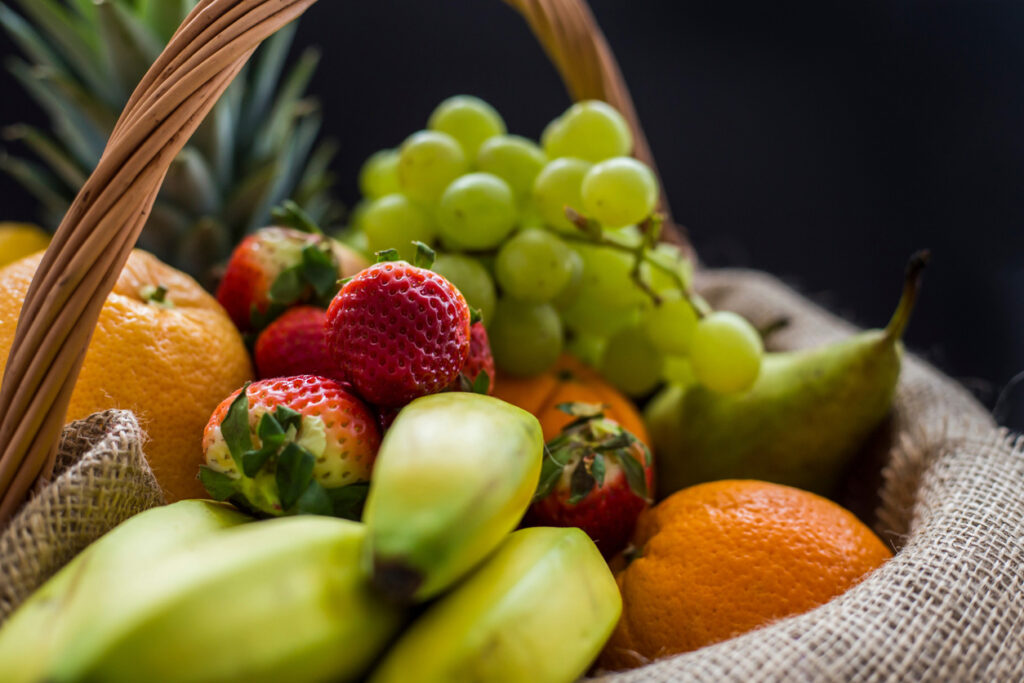Juicy Secrets: Unveiling the Power of Fruits!
Today’s post is a quick and flavorful journey to where common misconceptions meet “Fun Fruit Facts & FAQs”, vibrant colors, and essential nutrients!
In the world of health and wellness, fruits stand out as nature’s candy, packed with an abundance of vitamins, minerals, and antioxidants. Often overshadowed by trendier superfoods, these juicy delights hold the key to a myriad of health benefits, ranging from bolstering your immune system to rejuvenating your skin.

Fun Fruit Facts & FAQs
Q: What actually is a nectarine?
A: The main difference between a nectarine and a peach is the skin: nectarines have smooth, firm skin, while peaches are known for their fuzzy skin. This difference is due to a genetic mutation.
Both nectarines and peaches belong to the species Prunus persica, and they share similar flavors and characteristics. So, a nectarine is essentially a fuzzless variety of peach, not a hybrid of two separate fruits.
Q. Is it true that strawberries, raspberries, and blackberries aren’t “true” berries?
A. Yes. Strawberries, raspberries, and blackberries aren’t true berries. In botanical terms, a berry is a fruit produced from the ovary of a single flower with seeds embedded in the flesh.
Surprisingly, strawberries, raspberries, and blackberries do not meet this definition. They are instead considered aggregate fruits.
True berries include blueberries, grapes, and bananas.
Q. Wait! Bananas ARE Berries?
A. Indeed! Bananas are actually berries: While often not thought of as berries, bananas fit the botanical definition of a berry.
Q. Are tomatoes fruits or vegetables?
A. Tomatoes are fruits, not vegetables: Botanically speaking, tomatoes are fruits because they develop from the ovary of a flower and contain seeds. However, they’re often treated as vegetables in culinary contexts due to their savory flavor.
Q. Do Pineapples Grow on Trees?
A. Nope. Pineapples actually grow on a plant close to the ground. Each pineapple plant yields only one pineapple.
Q. Is Watermelon a fruit or a vegetable?
A. Actually, both! Watermelon is considered a fruit because it grows from a seed. But it’s also harvested from a field like vegetables and is part of the same family as cucumbers, pumpkins, and squash, which makes it a vegetable as well.
Q. Are green oranges real?
Yes. Oranges aren’t always orange: In warmer regions, oranges often remain green even when ripe, due to the presence of chlorophyll, which does not break down in warmer climates as it does in cooler areas.
Q. Why are “Seedless” fruits not always seedless?
“Seedless” fruits can have seeds: Seedless varieties of fruits like grapes and watermelons can sometimes contain small, immature seeds. These fruits are bred in a way that prevents the seeds from fully developing.
Fun Fruit Facts – Healthwise
Integrating a rainbow of fruits into your diet can not only tantalize your taste buds but also transform your health in ways you never imagined!
- Powerhouse of Nutrients: Many fruits are naturally low in fat, sodium, and calories, and none have cholesterol. They are rich in essential nutrients, like potassium, dietary fiber, vitamin C, and folate, that most people don’t get enough of.
- Natural Sweeteners: Fruits can satisfy your sweet tooth without the guilt! Because they’re naturally sweet, they can be a healthy substitute for sugary snacks and desserts.
- Disease Fighters: Eating a diet rich in fruits may reduce the risk of heart disease, including heart attack and stroke. Certain fruits like blueberries have antioxidants that can also combat the effects of free radicals, helping to prevent cancer and other diseases.
- Digestive Health: High fiber fruits like apples, pears, and berries help maintain regular bowel movements and can prevent constipation. This fiber can also aid in achieving a healthy weight.
- Hydration Heroes: Fruits like watermelon and cucumber have high water content, which can help keep you hydrated and feeling full.
- Brain Boosters: Certain fruits like avocados and bananas are known for their beneficial effects on brain health and can enhance memory and concentration.
- Skin Saviors: Fruits rich in vitamins C and E, such as oranges and kiwis, can help protect your skin against sun damage and can improve overall skin texture.
- Natural Mood Enhancers: Fruits can also have a positive impact on your mood. The natural sugars in fruits are accompanied by fiber, which allows the body to absorb them slowly, resulting in stable energy levels and mood.
Yum! But keep in mind…
While fruits are healthy, balance and variety are key in any diet. It’s important to consume fruits along with a variety of other foods for a well-rounded nutrient intake.
